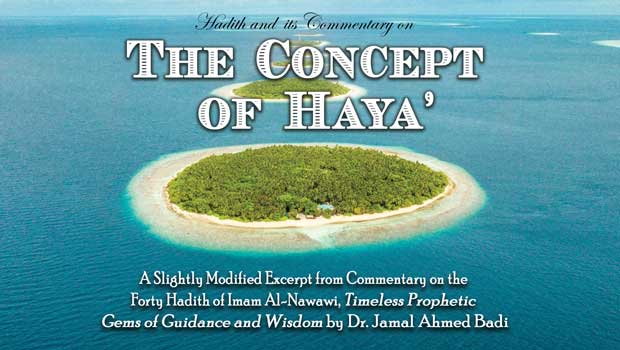An Excerpt from Commentary on the Forty Hadith of Imam Al-Nawawi
Timeless Prophetic Gems of Guidance and Wisdom
–
Abū Masʼūd ʼUqbah bin ʼAmr al-Anṣārī al-Badrī reported that the Messenger of Allah said: “Among the things that people have found from the words of the previous prophets was: ‘If you feel no shame, then do as you wish.’” (Related by Al-Bukhārī).
Introduction
Haya can be translated to mean modesty, shame, shyness, or bashfulness. The word haya is derived from the word “hayah”, which means life. Implicit in its meaning is that the person without haya is like a dead person . Islām encourages and treasures haya as it is one of the most important characteristics that a Muslim can have. Al-Imām al-Nawawī himself states: “All of Islām circles around this hadith”.
The following are some aḥādīth which emphasize this great quality:
“Haya and īmān are two that go together. If one is lifted, the other is also lifted” (Al-Hakim).
“Haya is part of īmān” (Sahih Muslim and al-Bukhari).
“Haya does not produce anything but goodness ” (Sahih al-Bukhari).
Lessons
A. Interpretations of this Hadith
The text of this hadith can be interpreted in three different ways which do not contradict one another. Al-Imām Ibn Rajab points out two interpretations according to early scholars.
The first interpretation of this hadith is that it a threat. Implied in the statement “If you have no modesty, then do whatever you wish”, is that “Allah SWT will punish you for it”. This mode of expression is well known in the Arabic language, and it is used as a form of threat. This mode is also used in the Quran for example: “Verily, those who turn away from Our āyāt are not hidden from Us. Is he who is cast into the Fire better or he who comes secure on the Day of Resurrection? Do what you will. Verily, He is All-Seer of what you do” [Sūrah Fussilat: āyah 40].
In the second interpretation, modesty is used as a criterion in deciding on whether one is to do a certain act. The command here is to indicate permissibility. If you are thinking about performing an act which you have no reason to be ashamed of doing before Allah SWT or anyone else, then you may perform that act.
There is a third interpretation given by Ibn al-Qayyim. He is of the view that the command is not about permissibility but rather a statement of fact. It means that if a person does not have any modesty, there is nothing to prevent him from doing anything. Haya is one of the most important factors that keep a person from committing a sinful act. If a person has no haya, he/she can do almost any evil.
B. Manifestations of Haya
Haya can be subdivided into natural haya and acquired haya. Natural haya is the modesty that every human being was born with through fitrah. An example of natural haya is reflected in the clothing people wear to cover their awrah. On the other hand, acquired haya is attained from awareness and realization of the glory of Allah SWT and His attributes.
There are many manifestations of haya as mentioned by Al-Sheikh Jamāl Zarabozo in “Commentary on the Forty Hadith of Al-Nawawi”:
i. Haya towards Allah SWT
A Muslim should feel ashamed to have Allah SWT seeing, hearing, and/or knowing of something which displeases Him. This is especially when that Muslim is alone and out of the view of others. The awareness of Allah SWT should increase haya towards Allah.
ii. Haya towards the angels
A Muslim should feel ashamed to have angels, noble and dignified, in recording his/her actions that are unlawful and impermissible.
iii. Haya towards other humans
This is an essential characteristic that keeps people from harming one another and from performing indecent acts. A Muslim should feel ashamed to have other humans witnessing him performing an unlawful act, and acts that should provoke shame.
iv. Haya towards oneself
A person should feel ashamed when he performs acts that are shameful. Shame is the natural reaction after committing a sin. If he realizes that his haya level is low, he should improve it by remembering Allah SWT, getting closer to Him, and fearing Him.
C. Challenges to Haya
All of us are born with natural haya. However, this natural tendency can be spoilt by the environment and dominating false ideologies. For example, people can become corrupted such that they lose their natural haya and expose their awrah without feeling shame. Misuse of technology can have a negative and destructive impact on haya. It is important to be cognizant that modern western culture has greatly denigrated and distorted haya. It promotes adultery and fornication, immodesty in clothing, and other fawahish to the point that even homosexuality is accepted. Modern media, the entertainment industry, and the internet are all being used to taint and corrupt haya at all levels. […] This great concept of haya should be promoted through all possible means, at all levels by everyone whether they are educators, teachers, lecturers, parents, and duʼāt.
If haya is distorted, īmān will be distorted as well. Recall the hadith: “Haya is part of īmān”. If haya is weakened, then the chance of committing sin will be higher. Furthermore, the delaying and/or neglecting of obligations will also be higher as well. Unfortunately, we Muslims borrow media material from the West without appropriate evaluation, censorship, or classification. Western entertainment and TV regularly display semi-naked people, violence, and other shameless behavior. Islāmic institutions and leaders need to create awareness of the harms of media, television, internet, and social media.
D. Misusing Haya
There are actually two types of haya. The first type is the one we have already been discussing and is the good and virtuous type. The second type of haya is actually blameworthy and is more accurately reflected by the word [خَجَل] . This means being timid and ashamed to speak or act for what is right. Thus, haya can sometimes be misused to justify neglect, indifference, or lack of concern of an obligatory act. For example, haya is sometimes used as an excuse for being silent or passive in the presence of falsehood or oppression, or for not encouraging good or discouraging evil. This is not appropriate as stated in discussion of Hadith 34, unless one expects more harm in speaking against wrong.
Another example of abusing haya is to use it as an excuse for not seeking knowledge. In many Muslim communities, there exists a culture where asking questions regarding religious matters are viewed as being immodest or rude. Parents, teachers, and even professors add to the problem when they treat asking questions as a sign of immodesty or aggressiveness. Similarly, many students also become shy in asking question under the cloak of modesty. Such an attitude needs to be changed, since this leads to Muslims being deprived of better understanding of Islām.
Haya can also be used as an excuse for not doing good deeds or acts. Here, a good deed is not done in front of others, even though the act is highly recommended or even obligatory. The person simply disregards the act citing haya. But this is a false meaning of haya, because it does not represent shyness in doing good deeds. We should not be shy or embarrassed to do good deeds in front of others because our intention is not to show off. Some examples of this phenomenon of using haya as an excuse are: Not giving sadaqah to a needy person in front of others, not removing a harmful object from the street or the path of other Muslims, or not helping a disabled person to cross the street. Good deeds often need to be done openly, even though it is preferred that they be done out of the view of others when possible.
Conclusion
Haya or modesty is a vital Islāmic concept that leads to much goodness in society. The different interpretations of this hadith enlighten us with many wisdoms and admonitions. We see that haya is a very important part of īmān and protects the Muslim from committing bad and indecent acts.
It is essential that we guard our sense of haya similar to how we guard our īmān or belief. Modern western culture has corrupted and denigrated haya, and its influence has seeped into the Muslim community as well. Muslims need to be aware of such challenges and must exert their utmost effort to preserve haya in their homes, communities, and culture. At the same time, it is faulty logic to use haya as an excuse for not doing good deeds and actions. Not only is this blameworthy, but it also obscures the true definition and exemplification of haya.






